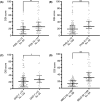The disease severity index for inflammatory bowel disease is associated with psychological symptoms and quality of life, and predicts a more complicated disease course
- PMID: 35633043
- PMCID: PMC9545845
- DOI: 10.1111/apt.17058
The disease severity index for inflammatory bowel disease is associated with psychological symptoms and quality of life, and predicts a more complicated disease course
Abstract
Background: The Disease Severity Index (DSI) is a novel tool to predict disease severity in inflammatory bowel disease (IBD). However, its ability to predict disease complications and the presence of psychosocial comorbidity is unclear.
Aims: To assess prospectively associations between the DSI and psychological symptoms, quality-of-life (QoL) and disease outcomes in an IBD cohort.
Methods: Patients with IBD undergoing ileocolonoscopy were followed prospectively for 12 months. DSI, psychological symptoms (perceived stress (PSS-10), depression (PHQ-9), anxiety (GAD-7)) and QoL (IBDQ-32) scores were assessed at baseline. Logistic regression identified variables predicting a complicated IBD course at 12 months (composite outcome of need for escalation of biological/immunomodulator for disease relapse, recurrent corticosteroid use, IBD-related hospitalisation and surgery). Receiver operating characteristics (ROC) analysis identified optimal DSI thresholds predicting a complicated disease course and multivariable logistic regression assessed the risk of reaching this outcome.
Results: One hundred and seventy-two patients were recruited (100 Crohn's disease, 91 female). Median DSI was 21 (IQR 11-32) and 97 patients had endoscopically active disease at baseline. The DSI was significantly higher in patients with symptoms of moderate-severe stress (PSS-10 > 14, p < 0.01), depression (PHQ-9 ≥ 10, p < 0.01), anxiety (GAD-7 ≥ 10, p < 0.05) and impaired quality-of-life (IBDQ-32 < 168, p < 0.01). Only the baseline DSI (OR 1.05, p < 0.01) and endoscopically active disease (OR 6.12, p < 0.01) were associated with a complicated IBD course. A DSI > 23 was strongly predictive of a complicated IBD course (OR 8.31, p < 0.001).
Conclusions: The DSI is associated with psychological distress, impaired QoL and predicts a more complicated disease course in patients with IBD.
Keywords: disease severity IBD; prognosis IBD; quality of life IBD.
© 2022 The Authors. Alimentary Pharmacology & Therapeutics published by John Wiley & Sons Ltd.
Conflict of interest statement
A.S. has received honoraria for educational activities for Janssen (unrelated to this manuscript). A.S.D. has served on advisory boards for Janssen, Abbvie and Nestle (all unrelated to this manuscript). C.A.S. has received personal fees as a consultant to Abbive, BMS, Lilly, Janssen, Pfizer, Prometheus, Takeda, Trellus Health; speaker fees for activities sponsored by Abbvie, Janssen, Pfizer, Takeda; grant support from Crohn's and Colitis Foundation: Leona M. and Harry B. Helmsley Charitable Trust, Abbvie, Janssen, Pfizer and Takeda (all unrelated to this manuscript). C.A.S. has equity interest as a co‐founder of MiTest health, LLC (software company). Technology developed by MiTest Health, LLC has been licensed to Takeda (unrelated to this manuscript). R.B.G. has received research grants, served on advisory boards and received honoraria for educational activities for Janssen, AbbVie and Zespri (unrelated to this manuscript).
Figures



Comment in
-
Editorial: measuring disease severity in inflammatory bowel disease-the whole is greater than the sum of its parts. Authors' reply.Aliment Pharmacol Ther. 2022 Aug;56(4):746-747. doi: 10.1111/apt.17126. Aliment Pharmacol Ther. 2022. PMID: 35879891 No abstract available.
-
Editorial: measuring disease severity in inflammatory bowel disease-the whole is greater than the sum of its parts.Aliment Pharmacol Ther. 2022 Aug;56(4):744-745. doi: 10.1111/apt.17108. Aliment Pharmacol Ther. 2022. PMID: 35879896 No abstract available.
References
Publication types
MeSH terms
LinkOut - more resources
Full Text Sources
Medical
